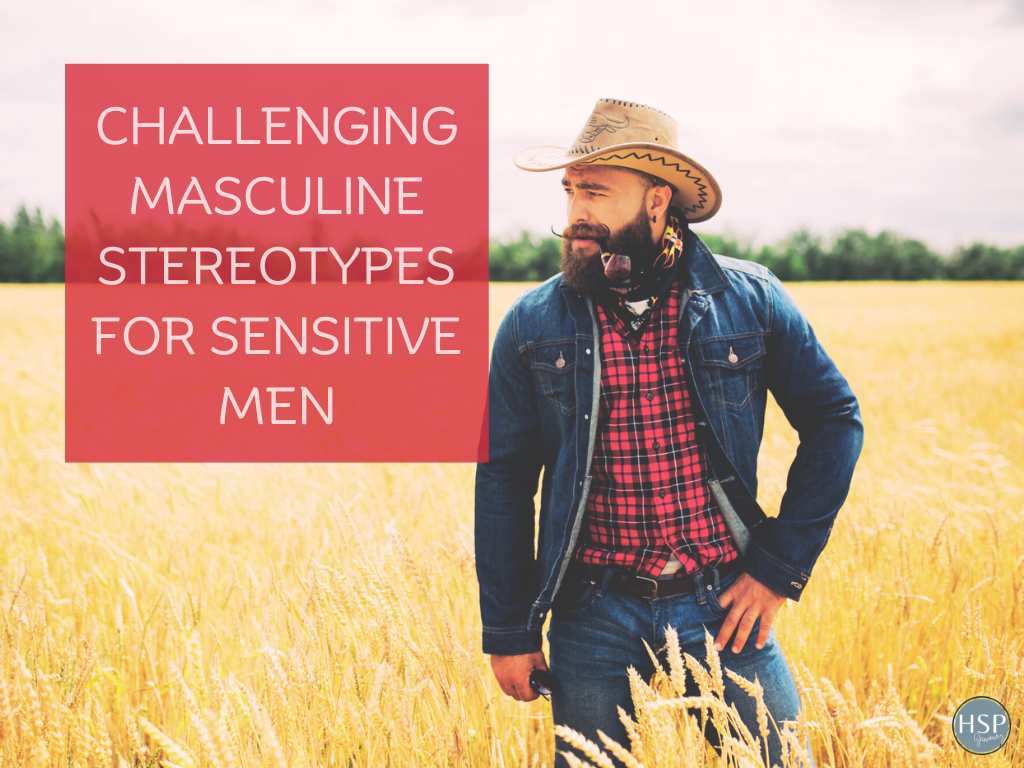Men who are highly sensitive have a tendency to struggle with masculine stereotypes. In this article, you will explore the concept of masculinity beyond traditional roles and challenge the preconceived notions that have restrained men for far too long. Challenging masculine stereotypes for sensitive men is an important and frequently overlooked topic.

Table of Contents
Outdated Notions of Masculinity for Sensitive Men
Outdated notions of masculinity have dominated societal expectations of men, emphasizing physical strength, stoicism, and dominance. These stereotypes ignore the unique qualities and characteristics that make each man an individual. To truly embrace masculine diversity, we must shift the focus from actions to character. A man’s values and integrity should define true masculinity and how he treats others rather than specific activities or hobbies.
Furthermore, emotional intelligence and vulnerability should be celebrated as essential aspects of masculinity. Men should be encouraged to express their emotions, fostering healthier relationships and personal growth. Challenging the “man up” mentality is crucial to dismantling the notion that masculinity equates to suppressing emotions or denying individuality.
The pressure on men to conform to unrealistic standards adversely affects mental health and self-esteem. This can be especially true for boys who grow up hearing that they need to “toughen up,” “stop acting like a girl,” or “stop crying” when they’re in real pain. While all sensitive kids – both boys and girls – have been harmed by a parent, teacher, or caregiver during their adolescent years, it is possible to overcome these toxic messages and embrace a different kind of adulthood that champions emotional strength, tenderness, loyalty, and sensitivity as strengths, not weaknesses.
Finding Role Models for Sensitive Men
Instead, we should celebrate male role models who defy stereotypes and showcase the breadth of masculinity. By highlighting their stories, we inspire others to embrace their true selves. Moreover, educating society about the damaging effects of stereotyping is essential for creating a more inclusive and accepting environment for all. In the fight for change, men and women must work together. Allies from all genders must challenge gender stereotypes and break free from societal expectations.
Sensitive Men Need Support
Supporting each other’s journey toward self-discovery and authenticity is paramount. Embracing diversity within masculinity means recognizing that there is no one-size-fits-all definition. By doing so, we foster a more inclusive and progressive society that celebrates the richness of every individual.
It’s time to redefine masculinity, moving away from rigid stereotypes that have confined men for far too long. Being a man is not about conforming to a predetermined mold but about embracing one’s unique qualities, values, and interests.
Challenging Expectations for Sensitive Men
By challenging societal expectations and celebrating the diversity of masculinity – including sensitive me – we can create a world that recognizes and respects the true essence of every man. It’s time for men to stand up, be proud of who they are, and reject the limitations imposed by unrealistic ideals. We can create a future where masculine diversity is embraced, celebrated, and respected.
Looking for HSP Tools to Thrive in a Chaotic World?
The modern world is often overwhelming and stressful for those of us with sensitive nervous systems. Many of us have suffered from the challenges of high stress, anxiety, sensory overload, and mental health and physical health issues. Fortunately, after years of working with and researching Highly Sensitive People (HSPs), Julie Bjelland has developed many tools that have not only helped her but thousands of HSPs all over the world move out of survival mode living and into thriving. In this free webinar, she’ll share the tools that HSPs have found the most life-changing. Her goal is to help you live to your fullest potential because the world needs you.
Join this free webinar and get tools to help you thrive as an HSP!
Frequently Asked Questions
How can we define healthy masculinity?
Defining healthy masculinity can be complex, but it generally refers to a set of behaviors and attitudes that promote positive and respectful interactions with others. Healthy masculinity involves traits such as empathy, emotional intelligence, and the ability to communicate effectively. It also involves rejecting harmful stereotypes and recognizing the value of diverse expressions of masculinity.
What are the common misconceptions about masculinity?
One common misconception about masculinity is that it is solely defined by physical strength and dominance. This can lead to harmful behaviors such as aggression and violence. Another misconception is that men should suppress their emotions and not show vulnerability. This can lead to mental health issues and difficulties in forming meaningful relationships.
How does toxic masculinity impact mental health?
Toxic masculinity refers to behaviors and attitudes that promote harmful and rigid expectations of masculinity. These expectations can lead to mental health issues such as depression, anxiety, and substance abuse. Toxic masculinity can also make it difficult for men to seek help and support, leading to further negative impacts on their mental health.
What strategies can be employed to promote diverse expressions of masculinity?
Promoting diverse expressions of masculinity involves challenging harmful stereotypes and promoting positive role models including highly sensitive men. This can be achieved through education and awareness campaigns, as well as creating safe spaces for men to express themselves without fear of judgment. It also involves recognizing and celebrating the diversity of masculinity, including different cultural and individual expressions.
How can society support men in challenging traditional gender roles?
Society can support men in challenging traditional gender roles by promoting gender equality and recognizing that men can be caretakers and emotional beings. This involves breaking down gender stereotypes and creating policies that support men in their caregiving roles, such as parental leave and flexible work arrangements. It also involves promoting positive and diverse representations of masculinity in media and popular culture.
What role do cultural influences play in shaping our understanding of masculinity?
Cultural influences play a significant role in shaping our understanding of masculinity. Different cultures have different expectations and norms regarding masculinity, and these can impact how men see themselves and their roles in society. It is important to recognize and challenge harmful cultural norms and promote positive and diverse expressions of masculinity.
Be sensitive, be free
*This post contains affiliate links and I will be compensated if you make a purchase after clicking on my links*





[…] For a deeper dive into this topic, explore the impacts discussed here. […]